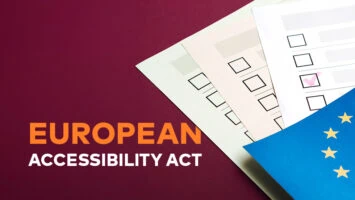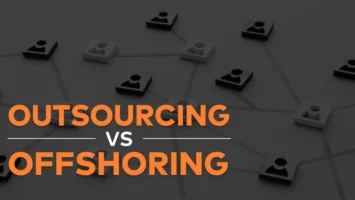The Digital Services Act and Digital Markets Act

Whenever technology comes up with something new, legal regulations usually need quite some time to catch up. The European Union has recently developed two important documents whose aim is to regulate the digital landscape – The Digital Services Act and the Digital Markets Act. The new rules will affect most internet users and large tech companies in some way, and we prepared a short summary of what to expect.
Background
The new rules for digital services were proposed by the European Commission in December 2020. Nearly two years later, an agreement was reached for the Digital Markets Act (25.03.2022) and the Digital Services Act (23.04.2022). They cover different aspects of the digital service landscape, updating the laws that in some cases date back as far as the year 2000, which can be considered “ancient history” with how quickly technology progresses.
What was the reasoning behind an updated set of legal regulations? When you think that a company such as Google was founded in 1998, and in two decades changed from a small brand into a huge enterprise that is now a dominant force shaping the entire cyberspace, the fact that some laws are still deeply rooted in the early days of 2000 should be a concern. Many aspects of the digital landscape have been left to companies to manage, and some of these companies have grown into huge international corporations that dominate the market, imposing their own rules, thwarting competition, and deciding on the content that users can or cannot experience. The two acts aim at leveling the playing field between businesses and ensuring the safety of users online.
How the new laws perceive digital services
The term digital services is very broad of course. The proposed regulations understand digital services as “a large category of online services from simple websites to internet infrastructure services and online platforms”. The new laws will relate to such entities as “online marketplaces, social networks, content-sharing platforms, app stores, and online travel and accommodation platforms”. This means that most of us who use the web will be affected in some way, depending on the services we are interested in.
The laws mention the term “gatekeeper platforms”, usually referring to big tech enterprises that have the biggest influence on shaping the digital market, often bottlenecking businesses and consumers in some way when it comes to providing or receiving digital services.
Digital Services Act
Let’s start with the DSA. The aim of this new regulation is to hold online platforms accountable for illegal or harmful content, following the idea that “what is illegal offline, should be illegal online”. The law provides improved protection to online users and aims at improving the chances of smaller businesses – “the greater the size, the greater the responsibilities of online platforms”. The businesses are to become transparent about their content moderation decisions, and counter the spread of disinformation and unsafe products. The part about transparency should be particularly helpful to YouTube creators who have often been vocal about being in the dark about what their content can or cannot include.
Once the law is introduced, there will be no platform “too-big-to-care”, and if the new regulations are ignored, the sanctions will include fines based on a percentage of the platform’s global turnover, or even a ban in the case of serious or repeated violations.
The provisions of DSA will concern the following entities:
- services that offer network infrastructure, such as internet access providers
- cloud computing and webhosting services
- the largest search engines with a significant reach in the EU
- online platforms, including social media platforms, app stores, marketplaces, etc.
- very large online platforms that could spread illegal content or cause social problems, with a significant reach in the EU
What does the DSA include? Here are a few selected highlights:
- the ability for users to easily flag illegal content, and the establishment of “trusted flaggers”
- rules on tracing business users in online marketplaces
- the ability for users to challenge platforms’ moderation decisions through different means
- platform transparency, e.g., regarding the algorithms for content recommendations
- obligations for large platforms and search engines to conduct independent audits of their specific systems
- improved protection for minors
- limits on the use of personal data for marketing purposes
- for the Commission – improved supervision and reaction capabilities with regards to large online platforms
After entering into force, the new law will be applied throughout the EU within 15 months or from 1 January 2024.
Digital Markets Act
The aim of the DMA is to level the playing field for businesses and end users in various areas related to digital services. The new regulations target platforms viewed as “gatekeepers” in the digital sector, so large online portals that are considered important tools for business users if they want to reach their target audiences. We can all come up with some ideas – Facebook, Instagram, YouTube, search engines such as Google and Bing, app stores, web browsers, even entire operating systems – they are all “gatekeepers” in some way. Here is the full list of digital services (extracted from the EU site) that will be affected by the DMA, with some likely candidates:
- web browsers (Chrome, Firefox, Opera);
- online intermediation services;
- search engines (Google, Bing);
- virtual assistants;
- social networking sites (Facebook, Twitter);
- video-sharing platforms (YouTube, TikTok);
- number-independent interpersonal communication services;
- various operating systems;
- cloud computing services (Amazon Web Services, Google Cloud Platform, Microsoft Azure);
- advertising services;
So far, platforms of this type have been able to impose rules and moderate content in an arbitrary way. They could impose the type of default software for the user to install upon registration, a specific online shop, the type of data shared, the ads, etc. Soon this will change. The goal is to create common rules for the digital services market to stimulate competition, innovation and growth, as well as to tackle the monopoly of large online platforms, ensuring an environment where smaller businesses and start-ups would get a fair shot.
Below are some of the obligations prepared for gatekeepers according to the Digital Markets Act:
- users are to be granted the ability to easily uninstall preinstalled features and change default settings and have choices for core services
- users are to be able to use third-party software and app stores instead of the suggested ones
- easy subscribe/unsubscribe in relation to services
- to allow third-party solutions to interoperate with the gatekeeper’s own solutions
- performance/marketing analytics tools are to be provided to users of gatekeeper platforms
- allowing users to do business with clients outside of their gatekeeper platform
- ban on the use of business user data when the said user competes with the gatekeeper
- ban on favoring gatekeeper products when compared to third-party products
- ban on forcing developers to make use of gatekeeper services in their software if they want the software to appear in gatekeeper shops
- ban on tracking users outside of the gatekeeper’s platform for advertising purposes without user consent
Notably, a major advantage for most of us will be the ability to exchange messages even if we use different software. This means that we should be able to send a text using Facebook Messenger to a person using, e.g., Telegram, WhatsApp, Skype, or Signal. With the introduction of DMA, gatekeepers will be obliged to provide this flexibility. It will be very similar to the way we use emails today – we may have different domains and use different clients, but that does not prevent us from exchanging emails.
The penalties for gatekeeprs that do not comply will be severe and will include fines of up to 20% of annual turnover, or up to 5% of daily turnover. The companies can also be forced to sell the business or parts of it, and be banned from acquiring other companies from the digital sector. Other forms of punishment are also possible.
We all know how rapidly technology develops. Recognizing this fact, the Commission paved the way for future updates of the Digital Marketing Act, either through supplementary documents or through revisions of DMA. The point is to keep up with the changes, making sure the new regulations can quickly adapt.
According to the info provided on the EU Commission website, the “regulation, will enter into force 20 days after publication in the EU Official Journal and will apply six months later.”
Conclusion
The EU Digital Services Act and the Digital Markets Act will introduce fundamental changes to the digital landscape. The European Union is taking decisive action to regulate big tech companies and to allow users and businesses alike to make free and informed decisions.
Subscribe to our newsletter to stay updated with all the important news, tech guidelines, and tips.
References
https://ec.europa.eu/commission/presscorner/detail/en/QANDA_20_2349
https://ec.europa.eu/commission/presscorner/detail/en/ip_22_2545


















